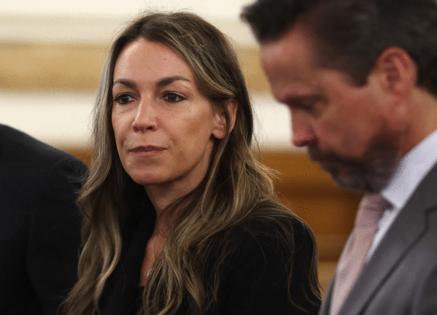Prosecution rests in Karen Read retrial
Published in News & Features
DEDHAM, Mass. — The prosecution rested its case against Karen Read on the 23rd day of testimony.
Read, 45, of Mansfield, faces charges of second-degree murder, manslaughter while operating a motor vehicle under the influence, and leaving the scene of a collision causing death. She’s accused of killing John O’Keefe, a Boston Police Officer she had dated for about two years at the time of his death on Jan. 29, 2022.
Just before declaring “The prosecution rests, your honor,” special prosecutor Hank Brennan played one final clip of Read speaking to the media.
“So, I thought, ‘Could I have run him over? Did he try to get me as I was leaving and I didn’t know it?’” Read said in an April 10, 2024, interview for the ID/HBO documentary “A Body in the Snow: The Trial of Karen Read.”
“I’ve always got my music blasting, it’s snowing. I’ve got the wipers going, the heaters blasting. Did he come and hit the back of my car,” Read continued as she does a tapping motion against the table in illustration, “and I hit him in the knee and he’s drunk and passed out and asphyxiated or something.
“And when I hired David Yannetti I asked him those questions the night of Jan. 29. Like, ‘David, what if, I don’t know, I ran his foot over or what if I clipped him in the knee and he passed out or went to care for himself and he threw up or passed out?’ And David said, ‘Well, then you have some element of culpability.’”
The video player is currently playing an ad. The prosecution rested following a very short day of testimony with crash reconstructionist Judson Welcher remaining on the stand, primarily for cross examination — though the cross wasn’t as robust as defense attorney Robert Alessi wanted it to be.
Ahead of the jury and Welcher coming into the courtroom Thursday, Alessi argued that he should be allowed to delve deeper into the materials that informed Welcher’s conclusions that O’Keefe died from a vehicle strike. He says that Welcher “adopted” those materials and reports for his own materials and reports.
“Adoption doesn’t mean you have to agree with it. It just means you have to put your expert hands around it, wrestle with it, deal with it,” Alessi said. “And there’s no rule of law that I’m aware of that says you can’t question an expert witness unless it’s something the expert witness agrees with.”
In particular, Alessi wanted to thoroughly cross-examine Welcher on the inputs of two others into his analysis and presentation of that analysis: Massachusetts State Police Trooper Joseph Paul, a crash reconstruction specialist — who did not take the stand for the prosecution in this second trial, but did last year — and Dr. Irini Scordi-Bello, the state medical examiner who performed O’Keefe’s autopsy.
Alessi said that the prosecution opposes his request for a particular reason: “The Commonwealth knows that Trooper Paul and Dr. Scordi-Bello are problematic for their theory and their narrative.”
He explained that Scordi-Bello was unable to determine whether O’Keefe died from a vehicle strike — she listed blunt-force injury to the head and hypothermia as the causes of death — and unable to determine the manner of death, meaning a conclusion like “homicide” or “accident.”
Testimony is over for the day, with the defense set to begin its case Friday.
_____
©2025 MediaNews Group, Inc. Visit at bostonherald.com. Distributed by Tribune Content Agency, LLC.







Comments